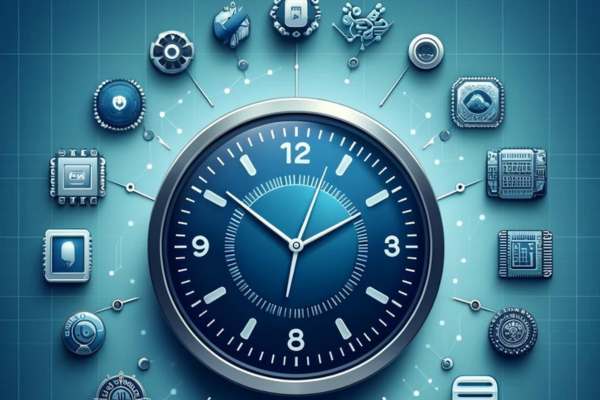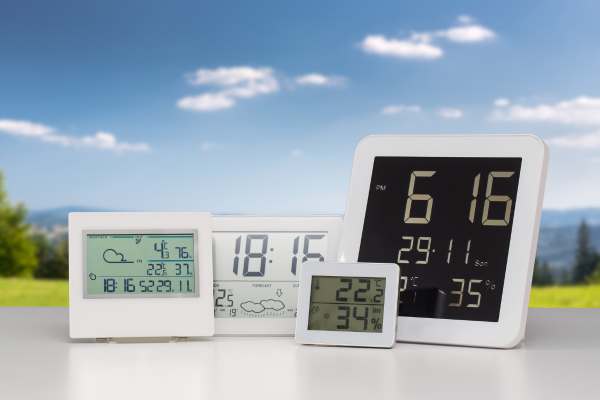In our fast-paced world, the ability to keep precise time is more critical than ever. “What is a Digital Clock. you might ask. A digital clock is a modern timekeeping device that uses electronic mechanisms to display time digitally, usually through an LCD or LED screen. Unlike traditional analog clocks that use hands to mark time, digital clocks provide clear, exact numerical readouts making them easy to read at a glance. This article explores the evolution, functionality, and widespread applications of digital clocks, highlighting their integral role in daily life and technology. Dive in to discover how digital clocks keep us all running on time.
Understanding Digital Clocks

A digital clock is a type of timekeeping device that displays the time in a numerical format, using digits rather than the hands and dials found on traditional analog clocks. This modern timepiece uses electronic mechanisms to measure and display time, which typically involves LCD or LED screens for clear, immediate readability. Unlike analog clocks, which utilize a series of gears and springs to move hands around a circular face, digital clocks operate through the oscillation of quartz crystals or synchronization with standard time signals like those from atomic clocks.
The basic components of a digital clock include a power source, such as batteries or electrical connections, a display panel, and a circuit board that contains the microprocessor and other electronic elements. These components work together to ensure precise timekeeping and often support additional features like alarms, timers, and calendars, making digital clocks a versatile and indispensable tool in many settings.
Types of Digital Clocks

Digital clocks have evolved significantly, offering various types tailored to different needs and environments. The most common type is the LED digital clock, known for its bright display and energy efficiency. LCD digital clocks are also popular, featuring a clear display that’s easy on the eyes. For those who travel, atomic digital clocks offer unmatched accuracy by syncing with the national standard. Smart digital clocks integrate with other devices, providing weather updates, calendar alerts, and more. Additionally, projection digital clocks display the time on walls or ceilings for easy viewing. Each type of digital clock serves unique purposes, ensuring there’s an option for everyone.
How Digital Clocks Work

Digital clocks function by utilizing electronic mechanisms to display time digitally. At their core, they rely on quartz crystals or atomic oscillators to maintain accurate time. When powered, the quartz crystal vibrates at a precise frequency, ensuring consistent timekeeping. These vibrations are converted into digital signals by a microprocessor, which then translates them into the numerical display seen on the clock’s screen. This digital representation of time is not only accurate but also easy to read, making digital clocks a popular choice in various settings, from homes to sophisticated technological environments. Their precision and reliability are key reasons for their widespread use.
Advantages of Digital Clocks

Digital clocks offer numerous advantages that make them a popular choice for timekeeping. Their clear, precise displays allow for quick and easy reading of time, reducing the chances of confusion compared to analog clocks. Many digital clocks also come with features like alarms, timers, and even calendar functions, enhancing their utility. The ability to include LED or backlit displays makes them visible in low-light conditions, ensuring time can be checked at any hour. Additionally, digital clocks can sync with other digital devices, providing accurate time updates automatically. These benefits make digital clocks an efficient and versatile choice in both homes and professional settings.
Common Uses of Digital Clocks

Digital clocks are ubiquitous in modern life, found in homes, offices, and public spaces worldwide. Their primary function is to display time accurately, but they serve various other purposes. Many digital clocks come integrated into appliances like microwaves and ovens, helping users time their cooking precisely. They are also essential in smartphones and computers, where they assist in scheduling and time management. Furthermore, digital clocks are vital in transportation systems, such as airports and train stations, where they provide travelers with real-time updates. Their versatility and precision make digital clocks an indispensable tool in managing daily activities efficiently.
Future of Digital Clocks

As technology evolves, the future of digital clocks promises enhanced integration with smart home systems and IoT devices. These clocks are expected to offer more personalized user experiences through voice-controlled interfaces and connectivity with other smart devices. Upcoming advancements may include features like health monitoring, ambient adjustments based on time of day, and even synchronization with personal calendars to streamline daily schedules. With these innovations, digital clocks will not just display time but will become an integral part of lifestyle management, offering more than just timekeeping but a holistic approach to managing personal and professional life efficiently.
4
Final Thought
Understanding what a digital clock is essential in today’s technology-driven world. Digital clocks display the time using numbers, typically on an LCD or LED screen, offering precision and clarity that surpass traditional analog clocks. These clocks not only show time but often feature additional functionalities like alarms, timers, and even temperature displays, making them versatile tools in everyday life. Whether you’re using them at home, in the office, or on your smartphone, digital clocks help keep you on schedule in an intuitive way. Embrace the convenience and accuracy of digital clocks to streamline your daily routines and enhance time management effectively.

